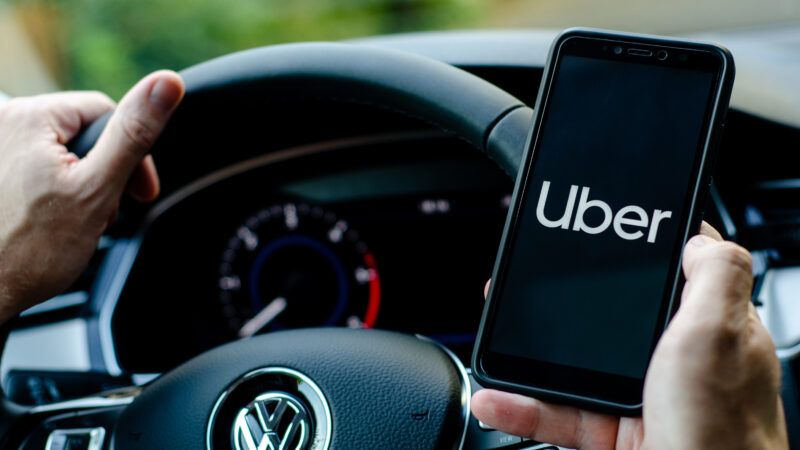The Justice Department Says in New Lawsuit That Uber's Wait Fees Discriminate Against the Disabled
The government argues that the company is violating the ADA by charging wait fees to disabled customers who take longer to board vehicles.

The U.S. Department of Justice (DOJ) is suing Uber over its policy of charging riders a fee if they make their driver wait more than two minutes. The claim? The DOJ says this is a violation of the Americans With Disabilities Act (ADA) because the fees have also been applied to disabled riders who, because of their disabilities, take more time to reach and enter their vehicles.
"People with disabilities deserve equal access to all areas of community life, including the private transportation services," said Assistant Attorney General Kristen Clarke for the Justice Department's Civil Rights Division in a press release. The lawsuit sends "a powerful message that Uber cannot penalize passengers with disabilities simply because they need more time to get into a car."
Uber has countered by saying that it regularly waives fees for disabled riders and that it was already in discussions with the DOJ about amending its wait fee policy further to address "concerns and confusion."
"Wait time fees are charged to all riders to compensate drivers after two minutes of waiting, but were never intended for riders who are ready at their designated pickup location but need more time to get into the car," said Uber spokesperson Noah Edwardsen in an email, saying the company "fundamentally disagree[s]" that its policies violate the ADA. He called the lawsuit "surprising and disappointing."
The DOJ lawsuit, which was filed on Wednesday, cites the stories of two anonymous disabled people as evidence of the discriminatory effect of Uber's wait fees.
That includes a woman with quadriplegia who was charged wait fees for the daily Uber rides she'd take from her apartment in downtown Louisville, Kentucky, to the nearby University of Louisville, where she was participating in a yearlong rehabilitation program. The complaint says that she noticed the fees after several months of taking Uber rides, but that despite informing Uber of her disability, a company employee said the fees were automatic and would not be waived.
The lawsuit also cites the experience of a New York City man who uses a wheelchair and was charged wait fees by Uber for the extra time he took getting into vehicles. The man asked for and received refunds from Uber for these fees, but was later informed that he had hit the maximum number of wait fee refunds the company would provide.
The DOJ lawsuit argues that these fees discriminate against the disabled either by charging them more for a service they regularly use or by deterring them from riding with Uber at all.
"Potential Uber passengers with disabilities know of Uber's wait time fees and will not use Uber because of those fees," reads the lawsuit.
It's not clear how much of a financial burden these wait fees impose. The DOJ includes no numbers either for how much the individuals in its lawsuit paid in fees, or how much in fees disabled riders might be paying in general. Uber says that the average wait fee charged to riders was less than 60 cents in 2020, although the fees vary by location.
The fact that the first woman cited in the DOJ lawsuit didn't notice the wait fees she was being charged on twice-daily rides until several months later suggests the burden wasn't that significant.
The Justice Department's lawsuit also slightly tips its hand by saying that some disabled people choose not to ride with Uber because of the fees. Clearly, those folks have other transportation options they can use. The cost and inconvenience of switching to those alternatives would presumably be less than the wait fees they were previously being charged.
One could make the argument that Uber is not discriminating against disabled riders simply by not exempting them from a general wait fee policy intended to compensate drivers for the time they spend idling before a ride starts.
That's kind of a moot point, as Uber also this past week has started automatically waiving wait fees for riders who self-certify as disabled.
With that explicit exemption in place, it's hard to see what exactly the DOJ lawsuit is supposed to accomplish other than perhaps grab headlines and get the department credit for policy changes Uber has already made.
It doesn't even appear that there would be a big financial windfall from the government in this case. The New York Times reports that Lyft's more explicitly discriminatory policy of allowing drivers to deny rides to people in wheelchairs ended in the company paying a $40,000 civil penalty and between $4,000–30,000 in compensation to four riders.
Ride-sharing services would seem to be a major mobility improvement for those with physical disabilities that prevent them from driving, who are ill-served by public transportation, and who might not have been able to easily afford pricey pre-Uber taxi and car services.
Yet it's these same ride-sharing services that the Justice Department is deciding to spend its time and your money going after for not being accommodating of the disabled.
Rent Free is a weekly newsletter from Christian Britschgi on urbanism and the fight for less regulation, more housing, more property rights, and more freedom in America's cities.


Show Comments (46)